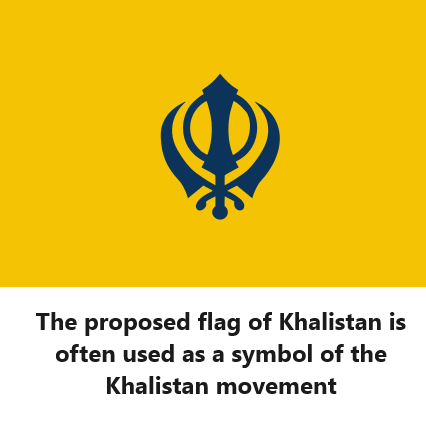
Prime Ministers of India and Canada at the G20 summit held in New Delhi InSAepterm,ber 2023
(Image by free to use handout) Details DMCA
Subramaniam Jaishankar, a career diplomat turned foreign minister of India, and his colleagues have been quite vocal in dubbing Canada as a 'haven' for Khalistani separatists; they are worried that Canadian cities have become unsafe for Indian diplomats.
This is a development following India-Canada diplomatic spat set-in motion by Prime Minister Justine Trudeau over the killing of Sikh separatist leader Hardeep Singh Nijjar (45) in Surrey, a Vancouver suburb with a large Sikh population.
(Courtesy: Wikipedia)
It is difficult, however, to gloss over the fact that the UK and the US were giving shelter to these elements much before they were lured by Canada's more liberal immigration policies. Put simply, foreign minister Jaishankar and his ilk should also be directing their ire at London, Washington and Canberra (if not some other capitals) with the same vehemence Delhi has reserved for Ottawa. Well, if verbal fuselage is capable of bringing results India wants.
The Sikh separatist movement may have been born in India but it did not take it long to establish roots in the UK way back in the 1960s and 1970s with Dr Jagjit Singh Chihan being a prominent leader. The Khalistanis exploited the Sikh diaspora to their end, even though to this day, the majority of the Sikh diaspora, as indeed the Sikh community within India, has refused to support the Khalistan concept of an independent nation for the Sikhs, carved out of India.
True, Canada appears to be in a special category because not only India but two of its neighbours, Bangladesh and Sri Lanka, have also accused it of giving refuge to fugitives wanted in their respective countries on serious criminal charges.
AK Abdul Momen, the economist-diplomat turned foreign minister of Bangladesh, is making a pointed attack. Canada is giving shelter to a Bangladeshi traitor, he says. His reference is to Noor Chowdhury who was involved in the assassination of Sheikh Mujibur Rehman (hailed universally as the father Bangladesh) and nearly all his family at their Dhaka residence on August 15, 1975. Canada has turned stone deaf to requests from Dhaka for sending Noor back to stand trial.
Sri Lanka is sore with Canada for letting in Tamilians suspected of links to separatist Tamil Tigers. Also, for marking May 18 as 'Tamil Genocide Remembrance Day' when, Colombo says, no 'genocide' had taken place in the island nation. No surprise, Foreign Minister Ali Sabry says, "terrorists have found 'safe haven' in Canada, we support India's 'strong' response". He goes on to add: "I am not surprised with (Canadian Premier) Trudeau's outrageous and unsubstantiated allegations linking India's role behind Nijjar's killing."
While Jaishankar on the US soil was fulminating against the Canadians, reports came from Glasgow that the Indian high commissioner in the UK, Vikram Doraiswami, was prevented from entering the Gurdwara where he was invited as a guest. The police were informed in advance about the high commissioner's visit. He was stopped by three persons, who, the Gurdwara management said, were 'outsiders', and "not regular local visitors".
How just a group of three people was able to stop the Indian diplomat from entering the Gurdwara while the Gurdwara management watched helplessly? Why could the trio not be overpowered? Did the local police send any personnel to the Gurdwara or did the police merely assume that there was absolutely no threat to peace of any kind? A deeper probe is required.
It is possible that the police with caps and without caps in Scotland and the UK think that the Khalistani activists who swarm all over the country will always disperse after a 'peaceful' demonstration against Indian government, and its functionaries. This surmise glosses over the fact that the Sikh separatists advocate and justify violent means, and have been part of many plots to kill innocent people.
One of the most reprehensible plots attributed to the Khalistanis was the mid-air bombing of Air India flight 182, Kanishka (Boeing 747-237B), from Toronto to New Delhi on 23 June 1985. All the 329 aboard were killed when it exploded over the Atlantic about 190 kilometres (120 miles) off the coast of Ireland. It was the worst terrorist attack in Canadian history and the world's deadliest act of aviation terrorism until the September 11 attacks shook the US and the world at large 16 years later in 2001.
Canadian police arrested and tried a handful of people, according to Wikipedia, but only one person, Inderjit Singh Reyat, a dual British-Canadian national, was convicted in 2003 of manslaughter. He emigrated to Western Canada during the 1970s like fellow Punjabis, Talwinder Singh Parmar, Ajaib Singh Bagri and Ripudaman Singh Malik, who became prominent in British Columbia and turned it as the largest centre of Sikhs outside India.
(Note: You can view every article as one long page if you sign up as an Advocate Member, or higher).






